
The brown hairstreak is a butterfly in the family Lycaenidae. The range includes most of the Palaearctic.

Ixias marianne, the white orange tip, is a small butterfly of the family Pieridae, found in India and Sri Lanka.

Lampides boeticus, the pea blue, or long-tailed blue, is a small butterfly that belongs to the lycaenids or gossamer-winged family.
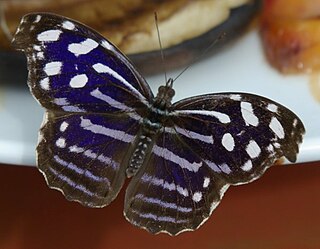
Biblidinae is a subfamily of nymphalid butterflies that includes the tropical brushfoots. This subfamily was sometimes merged within the Limenitidinae, but they are now recognized as quite distinct lineages. In older literature, this subfamily is sometimes called Eurytelinae.
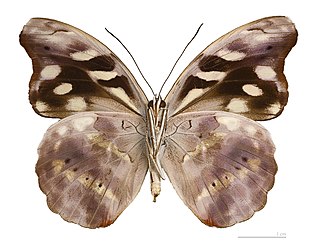
Catonephele is a nymphalid butterfly genus found in Mexico, Central America, South America, and the West Indies.

Catonephele orites, the orange-banded shoemaker butterfly, is a species of butterfly found throughout the northern coast of South America and into Central America.
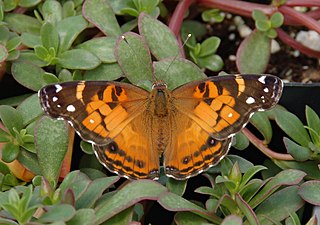
The American painted lady or American lady is a butterfly found throughout North America.

Kallima inachus, the orange oakleaf, Indian oakleaf or dead leaf, is a nymphalid butterfly found in Tropical Asia from India to Japan. With wings closed, it closely resembles a dry leaf with dark veins and is a commonly cited example of camouflage.
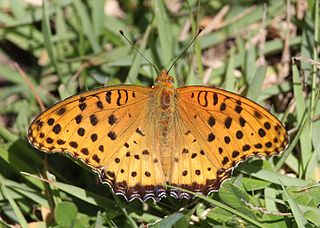
The Indian fritillary is a species of butterfly of the nymphalid or brush-footed family. It is usually found from south and southeast Asia to Australia.

Asterocampa clyton, the tawny emperor, is a species of brush-footed butterfly. It is native to North America, especially the eastern half from Canada to northern Mexico. The tawny emperor should not be mistaken for a very similar Asterocampa butterfly, the hackberry emperor, which can be distinguished by the white spots near the tip of its forewing and the black eyespot lower along the edge of the forewing.
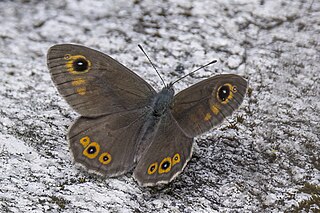
Lasiommata maera, the large wall brown, is a butterfly in the family Nymphalidae.

Libythea celtis, the European beak or nettle-tree butterfly, is a butterfly of the Libytheinae group of the brush-footed butterflies family.

Nathalis iole, the dainty sulphur or dwarf yellow, is a North American butterfly in the family Pieridae.

Polites themistocles, the tawny-edged skipper, is a North American butterfly in the family Hesperiidae.
Agathymus neumoegeni is commonly referred to as the orange giant-skipper, Neumogen's giant-skipper, Neumogen's agave borer, Neumogen's moth-skipper, and tawny giant-skipper.

Charaxes protoclea, the flame-bordered emperor or flame-bordered charaxes, is a butterfly of the family Nymphalidae. It is found Subsaharan Africa. It is a common forest charaxes.

Papilio zagreus is a butterfly of the family Papilionidae (swallowtails). It is found in South America, including Venezuela, Colombia, Ecuador, Peru, Bolivia and western Brazil.
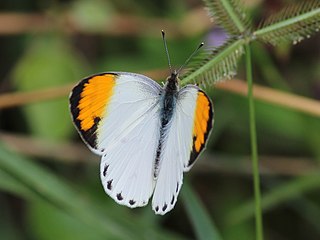
Colotis aurora, the sulphur orange tip or plain orange-tip, is a butterfly in the family Pieridae. It is found in Asia and Africa. The nominate subspecies, Colotis aurora aurora is found in India and Sri Lanka. The other subspecies, Colotis aurora evarne is found in Mauritania, Senegal, the Gambia, Mali, Burkina Faso, Ghana, Benin, Nigeria, Chad, Sudan, Ethiopia, Uganda, Kenya, Rwanda, Tanzania, the Democratic Republic of the Congo, Somalia, and southern Arabia.

Catonephele acontius, the Acontius firewing, is a nymphalid butterfly species found in South America. It was first described by Carl Linnaeus in 1771.
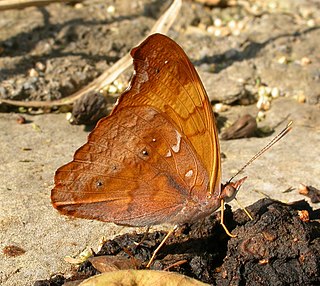
Temenis is a genus of butterflies in the family Nymphalidae, it consists of three species. It was first described by Jacob Hübner in 1819. Members of the genus Temenis are found throughout Central and South America.



















